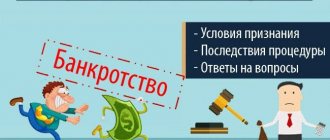It became possible to recognize the bankruptcy of individuals from October 1, 2015. Thus, legislators provided citizens with a chance to get rid of debts and start a quiet life. However, after completion of the personal bankruptcy procedure, a number of temporary restrictions are imposed on the debtor
. What bankruptcy gives, what legal consequences await after declaring one's insolvency and how to go through the procedure with minimal losses, we will consider further.
Consequences for the debtor: what are they?
What does it mean to declare bankruptcy? The main consequence of bankruptcy of individuals. persons is that from the moment the procedure is completed, banks and other creditors can no longer make claims against the debtor. Regardless of the size of the debt and the wishes of the creditors, the debts are written off.
Why is bankruptcy bad? The legal procedure takes too long, and the debtor will have to bear significant costs. There is also a risk of prosecution, cancellation of transactions, and refusal to write off debts. All pitfalls and disadvantages can be foreseen and avoided if you contact a lawyer and assess the prospects of the case in advance.
Let us help you write off your debts
Our lawyer will call you in a few minutes and answer all your questions
Among the negative consequences and restrictions of bankruptcy of individuals, the following should be highlighted:
- inability to re-recognize bankruptcy for some time;
The debtor will not be able to re-file for insolvency for 5 years after the completion of the previous bankruptcy case. - the fact of bankruptcy cannot be hidden;
When trying to take out a new loan, an individual will have to provide banks with information about the fact of his bankruptcy within 5 years after it. - deprivation of the right to hold a leadership position;
For 3 years (sometimes longer) after a citizen is declared bankrupt, he is prohibited from being the head of a legal entity. persons or state-owned companies to serve on the board of directors. If the debtor went through bankruptcy as an individual entrepreneur, then he will not be able to obtain the status of an individual entrepreneur for 5 years. - Bankruptcy information will be reflected in your credit history.
After completing the bankruptcy procedure of an individual, information about the fact of bankruptcy of a citizen is recorded in the credit history bureau.
Section 213.30. Consequences of declaring a citizen bankrupt
- Within five years from the date of completion of the procedure for the sale of property in relation to a citizen or the termination of bankruptcy proceedings during such a procedure, he has no right to assume obligations under credit agreements and (or) loan agreements without indicating the fact of his bankruptcy.
- Within five years from the date of completion of the procedure for the sale of property in relation to a citizen or the termination of bankruptcy proceedings during such a procedure, a bankruptcy case cannot be initiated at the request of this citizen.
- For three years from the date of completion of the procedure for the sale of property in relation to a citizen or the termination of bankruptcy proceedings during such a procedure, he has no right to hold positions in the management bodies of a legal entity, or otherwise participate in the management of a legal entity, unless otherwise established by this Federal Law .
Federal Law of October 26, 2002 N 127-FZ (as amended on December 30, 2020) “On Insolvency (Bankruptcy)”
(with amendments and additions, effective from 01/02/2021)
Read completely
Source
Briefly about the stages of the bankruptcy procedure
Let's look at how the insolvency issue proceeds.
REGISTERING AND SUBMITTING AN APPLICATION TO THE COURT FOR RECOGNIZING A CITIZEN BANKRUPTCY
CONSIDERATION OF THE APPLICATION BY THE COURT
| Positive decision | Negative decision (the application is returned to the debtor) |
|
|
| Introduction of debt restructuring. | Sale of property | Settlement agreement |
|
|
|
What are the consequences of bankruptcy for relatives of the debtor?
In some cases, bankruptcy may have consequences for the debtor’s relatives—primarily this applies to spouses.
For the debtor's spouse
In case of bankruptcy, property that spouses own jointly can be sold at auction.
A car purchased during marriage is considered joint property. During the bankruptcy process, it will be sold at auction. For the debtor's spouse, only compensation in the form of cash (50%) is due. Practice shows that such payment is often insufficient, because property sometimes goes under the hammer at a price significantly lower than the market price.
Transactions that are contested by the financial manager have similar consequences. If the transactions are successfully contested, such property is included in the bankruptcy estate and sold at auction. However, the spouse is paid compensation for his share after the claims of creditors are satisfied.
For example, if a spouse entered into a transaction to donate real estate acquired during marriage, and six months later decided to declare himself bankrupt, such a transaction will be challenged by the financial manager. Part of the funds will be paid to creditors, and the second part will rightfully be returned to the debtor’s spouse.
Other relatives
Their interests can suffer only in two situations:
- If the debtor has entered into transactions with relatives over the past 3 years (donation, purchase and sale). Such transactions may be contested and annulled, and the property will be sold at auction;
- If one of the relatives shares with the debtor a house or other property that is in shared ownership. If, for example, the land belongs to the debtor and his brother. In the event of bankruptcy, the debtor's share will be subject to sale and, upon sale, will become the property of the new owner.
The good news is that hunters are usually not in the market for a share, even at a reduced price. In addition, according to the law, relatives of the bankrupt can also participate in the auction and buy part of the property put up for sale into their own property, thereby protecting themselves from attacks from outsiders.
What debts will not be written off under any circumstances?
What happens if you declare yourself bankrupt? Many citizens are confident that upon completion of the bankruptcy procedure, absolutely all debts
, However, it is not. There are debts that cannot be written off even as a result of bankruptcy.
After judicial or extrajudicial bankruptcy procedures, damage compensation and alimony debts will remain unwritten off.
Alimony payments for the maintenance of a child, incapacitated parents or spouse
In accordance with the norms of the Family and Civil Codes, alimony can be paid not only for the child. They may be assigned to support their parents and spouse if one of them is disabled or if the spouse is on maternity leave to care for a child. Such obligations must be confirmed by a relevant court decision.
For example, you divorced your wife, but by a court decision you must pay 14,000 rubles monthly for the maintenance of a common child. You did not pay properly, and over several months the amount of 70,000 rubles accumulated. Such debt will also not be written off.
Compensation for damage to health, property and life
Such debts may arise from court decisions if the debtor has previously been subject to criminal or civil liability. For example, he became the culprit of an accident. The court could oblige the offender to pay compensation to the victim in the amount of 30,000 rubles. This debt will also not be written off in bankruptcy.
Likewise, debts for moral damages must be paid in any case.
You can find out the amount of your debts through the debt check form on our website.
Hidden negative consequences
In addition to the above negative aspects of the insolvency procedure, there are also hidden negative consequences for the debtor. Some are worth knowing about before going to court.
- Intentional bankruptcy is a situation in which the debtor could avoid going to court for recognition of bankruptcy. For example, there are financial obligations in favor of the debtor (owing money). Article 196 of the Criminal Code of the Russian Federation.
MORE ABOUT FICTIONAL BANKRUPTCY IS SET FORTH IN THE ARTICLE >>>
Intentional bankruptcy: features, signs and responsibility
- Fictitious insolvency. The citizen creates the appearance of insolvency, usually by falsifying financial documentation. After which it sends an application to the court. Thus, a person hopes for a deferment in payments or complete debt write-off. Article 197 of the Criminal Code of the Russian Federation.
- Wrongful bankruptcy. Hiding valuable property, illegal transactions, resale to relatives, settlements with some creditors, ignoring the demands of others, misleading the financial manager.
Declared bankrupt: what next?
There are two ways to recognize your insolvency in court - through debt restructuring or sale of property. In both cases, the following restrictions apply to the debtor
:
- The debtor will not be able to buy and sell securities, shares and shares of companies.
- A bankrupt is prohibited from donating his assets to third parties or contributing them to the formation of authorized capital.
- Registration/re-registration of the debtor's property can only be carried out by a financial manager.
- The debtor will not be able to fully manage his accounts, income, deposit funds and bank cards - all financial issues are dealt with by the appointed arbitration manager.
- A citizen in respect of whom bankruptcy proceedings are being carried out cannot act as a guarantor, guarantor, or engage in the purchase or sale of debts.
- Also, he will not be able to mortgage his property without the permission of the financial manager.
- When going through the debt restructuring procedure, the purchase of property worth more than 30,000 rubles should be carried out only with the consent of the financial manager.
- A person may be restricted from traveling abroad, but if necessary (for example, when treatment or an important family event is due), the court lifts the ban.
- Only a financial manager can open and close bank accounts.
However, not all consequences of declaring a citizen bankrupt are negative. Towards positive circumstances
, which begin to operate from the beginning of the bankruptcy procedure, include the following points:
- The amount of debt is frozen and does not grow (excluding penalties, interest rates, penalties and interest).
- All collections against the debtor are suspended, and bailiffs will not be able to seize property or bank accounts.
- Claims are sent only to the court that carries out the procedure for recognizing insolvency in relation to individuals. faces.
- Debt obligations are repaid in a strict manner prescribed by law. If debt restructuring was approved, then according to the established plan; if implementation, then as the property was sold according to priority.
Negative consequences of insolvency proceedings for creditors
Not only physicists facing insolvency, or their relatives, face troubles during and after the end of legal proceedings. What consequences of bankruptcy of an individual affect creditors:
- Fraud. It is not uncommon for a citizen to deliberately stop paying a loan in order to be able to file a petition to have it declared insolvent. Even if a settlement is reached, the claimant loses funds because the debtor does not pay most of the interest or penalties.
- Refund of only part of the money. When the property is sold, money is returned to creditors. However, the bankruptcy estate, even after the sale of all property assets, is rarely enough to fully satisfy the claims of creditors.
- Loss of benefit. Creditors cannot charge fines, penalties and penalties on debt.
As you can see, claimants lose a significant part of the money they are entitled to when selling property. However, an undoubted advantage is that they return at least part of the due funds. Collection of funds through the courts and the bailiff service may not always be successful; in this case, credit institutions simply write off the debt.
Consequences of bankruptcy through the MFC
In 2021, the state allowed to write off debts up to 500 thousand rubles. through MFC. However, extrajudicial bankruptcy is possible only for those whose enforcement proceedings have been closed under clause 4, part 1, art. 46 of the Law “On Enforcement Proceedings”.
Extrajudicial bankruptcy ends with MFC specialists making a decision to release the debtor from obligations. This data is posted on Fedresurs.
As in the case of the arbitration process, debt for personal obligations (alimony, compensation for damage to health, a number of other obligations) will not be written off. Also, release from obligations not specified by the debtor in the application is not allowed.
After completing the simplified procedure, the following consequences occur for the debtor:
Material on the topic
How to write off debts through extrajudicial bankruptcy of individuals in 2021
Extrajudicial (simplified) bankruptcy of individuals allows you to legally write off...
- exemption from the obligations listed in the MFC decision;
- the obligation to notify banks and microfinance organizations about the bankrupt status within 5 years when applying for new loans and borrowings;
- a ban on re-going through bankruptcy for 10 years (through the MFC) or for 5 years (for writing off debts through arbitration);
- ban on holding leadership positions in legal entities (depending on the type of organization, the ban will be valid for a period of 3 to 10 years).
Separate restrictions are provided for in Law No. 127-FZ for the bankruptcy of entrepreneurs. If the application was submitted by an individual entrepreneur
or a citizen who closed his business within a year before filing for bankruptcy through the MFC, the following consequences arise:
- Data is transmitted to the tax authority to exclude information from the Unified State Register of Individual Entrepreneurs;
- the possibility of re-registration as an individual entrepreneur is limited for 5 years; all licenses issued in the name of the entrepreneur are automatically canceled;
- a ban is introduced on participation in the management bodies of legal entities for a period of 5 to 10 years (the period depends on the type of legal entity).
Repeated application for extrajudicial bankruptcy for individual entrepreneurs is also possible only 10 years after completion of the procedure.
What are the risks of bankruptcy for an individual?
It is necessary to understand that if you have a car or apartment that is pledged
According to the loan agreement, such property is subject to sale with virtually no options. You should prepare well for bankruptcy to avoid other hidden consequences and risks.
Thus, the debtor may be accused of:
- in illegal actions;
Administrative liability arises if the debtor makes settlements with one of the creditors without the knowledge and consent of the others. Also, if he interferes with the work of the arbitration manager or attempts to take any actions with the property without his consent. - in fictitious bankruptcy;
A debtor can be accused of fictitious bankruptcy if he begins the procedure by hiding his property in advance. For example, if the debtor, before declaring insolvency, sold his car and transferred money from the account to an offshore. Such problems arise when, during the verification process, the financial manager or creditors find hidden assets of the bankrupt. - in deliberate bankruptcy.
If the debtor deliberately “slipped” his affairs into a hole of debt - for example, he took out loans and did not pay on them, although he had a good salary. The manager also identifies signs of deliberate bankruptcy.
These negative consequences can be foreseen and eliminated. Judicial practice and reviews show that in most cases, citizens go through the procedure for recognizing their insolvency faster and easier if they prepare for the case in advance, having first studied the Federal Law “On Bankruptcy”. The consequences of the bankruptcy procedure mainly concern a number of temporary restrictions and do not interfere with life after its completion.
If you have an insoluble situation with loans, bankruptcy will be the best solution. Contact us - we will help you quickly get rid of debts.
For professional legal advice, call us by phone or write online.
We will write off debts legally
Our lawyer will call you in a few minutes and answer all your questions
our team

Vladislav Kvitchenko
CEO

Tatiana Smirnova
Senior bankruptcy lawyer persons
- Grigory Nechaev
Bankruptcy lawyer persons
- Oleg Martin
Financial analyst
- Yaroslav Mitkov
Junior bankruptcy lawyer persons
FAQ
- Will they be able to get a mortgage after bankruptcy?
Declaring a citizen bankrupt does not prevent him from applying for credits and loans, including mortgages. However, by virtue of Art. 213.30 of Law No. 127-FZ, a citizen is obliged to notify the bank about the completed bankruptcy procedure. This requirement must be met for 5 years after the bankruptcy is completed. If the bank is notified of the bankruptcy, it may still approve the application and issue the mortgage. - Can maternity capital be taken away due to bankruptcy?
Maternity capital is a measure of support for families with children. It is not subject to sale or cancellation for debts. MSC funds are transferred to the family only for specific purposes, and until this moment are in the accounts of the Pension Fund. Therefore, in enforcement proceedings or during bankruptcy, maternity capital cannot be foreclosed on.
If MSC funds have already been used to purchase housing, it can be foreclosed on according to the general rules. If this home was purchased without a mortgage and is the only real estate for the family, it will not be able to be sold during bankruptcy. If an apartment purchased under MSK is sold, maternal capital funds can be allocated from the sale amount, since this is a guarantee of the interests of minors.
- The court banned traveling abroad during bankruptcy, how can the ban be lifted?
A ban on the debtor's travel abroad may be imposed by the court simultaneously with the issuance of a decision on declaring bankruptcy. The ban will remain in effect until the termination or completion of the bankruptcy procedure. If the case is completed, the judge must lift the restriction.
The law allows you to file a petition to lift the ban even before the bankruptcy is completed. The application must indicate and justify the reason why the debtor needs to travel abroad. A valid reason may be leaving for treatment, to continue studies, on a business trip, or for other similar circumstances. When considering the issue, the judge is obliged to take into account the opinion of the manager and creditors who may present objections.
- Can a debtor go to study in another country during bankruptcy?
Article 213.24 of Law No. 127-FZ allows the court to decide on a temporary ban on the debtor traveling abroad, including for education. The temporary travel restriction will remain in effect until the date of completion or termination of the bankruptcy case. However, in Art. 213.24 of Law No. 127-FZ is an important rule. If the debtor has a valid reason for traveling to another state, he can file a petition to lift the restriction. But the court will make a decision on this issue taking into account the opinions of creditors and the financial manager.
How beneficial is declaring insolvency?
Before going to court, a citizen needs to understand that the insolvency procedure is far from getting rid of debt obligations. First of all, everything is aimed at resolving the issue, the claims of creditors, and helping to solve the current financial problem. Recognition of physical persons insolvent, does not bring benefits. The procedure can help reduce payments on credit and other financial obligations if you have a regular income.
If a person is unable to fully service the debt or the amount of the debt is too high, valuable property is sold to satisfy the demands of the creditors. After which the balance of the debt is written off.
Also, do not forget that the procedure is not free, and to start it, the debtor will need at least 25,300 rubles. 25 thousand is deposited into the deposit account of the court, 300 rubles is the state tax sanction for filing an application. Payment for the work of the arbitration manager is also required. The procedure is legally not simple, so it is best to seek help from qualified specialists - and this also means additional financial costs.
From all of the above, we can draw the following conclusions - before resorting to the procedure, it is worth weighing the pros and cons.
Video on the topic
Consequences of bankruptcy
Author:
Vladislav Kvitchenko
CEO . Practicing lawyer in the field of bankruptcy of individuals. persons Since 2015, she has been successfully handling insolvency cases. Vladislav is brilliantly versed in bankruptcy law, gives expert comments on legal situations and actively publishes in specialized publications.








